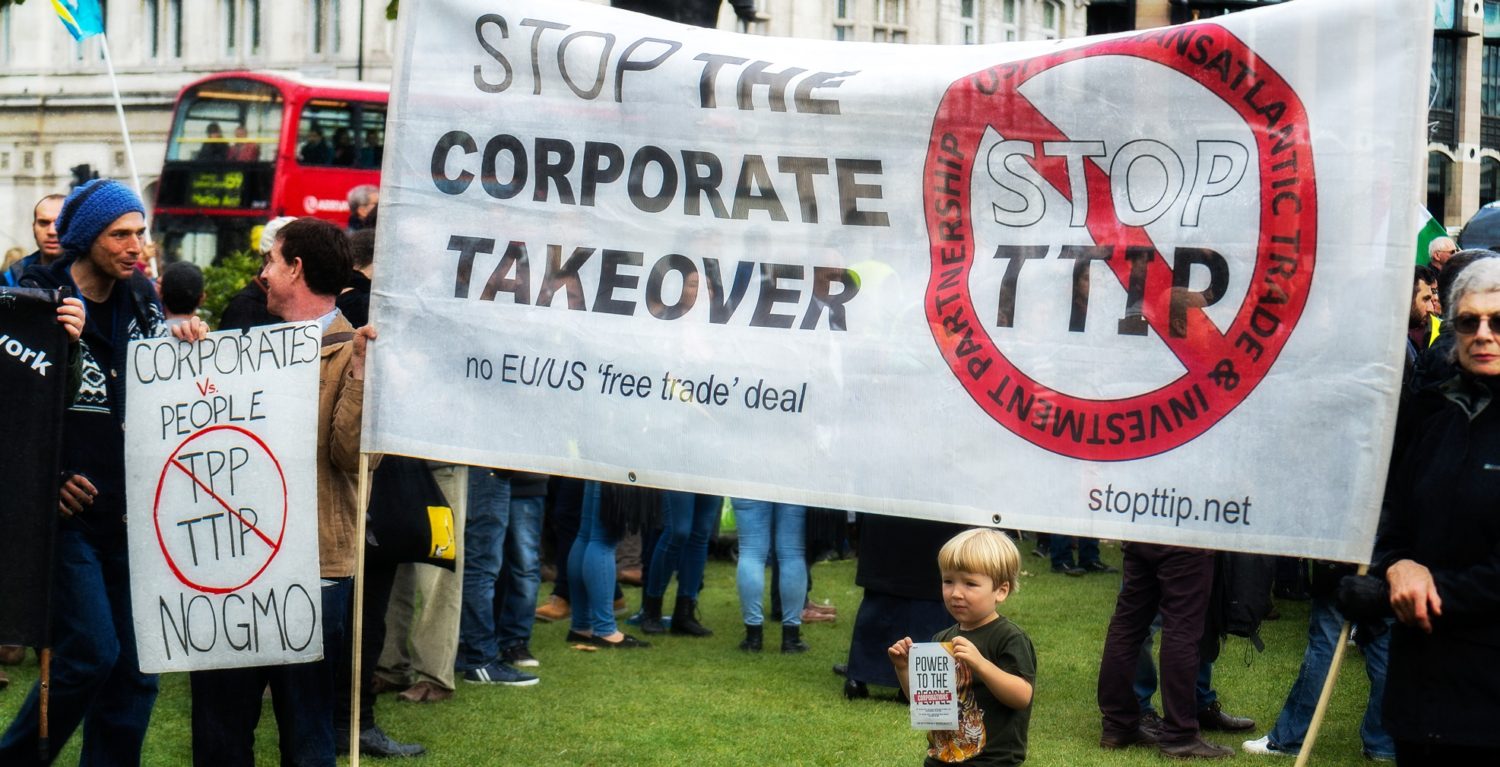Tricks of the trade
We need to challenge the way we trade, argues Nick Dearden.
The most important element of Brexit for many Conservative MPs is not controlling migration. Nor is it parliamentary sovereignty, per se. It is Britain’s ability to conduct an independent trade policy.
One of the most lasting legacies of Donald Trump might well not be his disastrous decisions on Iran, or even his encouragement of authoritarian strongmen, but his trade wars with the rest of the world.
How has something as arcane as trade policy become so central to the political landscape? In a nutshell, because global trade rules today are about far more than tariff levels. They encapsulate the rules of the global economy. They are about how we regulate our food standards, how we run our public services, how much we pay for our medicines. They touch on workers’ rights, public services, and climate change.
But more and more working people in Europe and North America are falling out of love with free trade. It’s no wonder when you think that over the last 20 years, under the rubric of free trade, jobs, industries and regions have been hollowed out thanks to the ‘race to the bottom’ logic of modern trade rules.
Millions of Europeans and Americans were active in opposing and defeating the enormous proposed trade deal between the EU and US, the Transatlantic Trade and Investment Partnership (TTIP), not simply because they feared for their jobs but because they opposed the corporate takeover which modern trade deals represent.
TTIP threatened to weaken European food standards by forcing the import of chlorine-washed chicken, steroidfilled pork and hormone-treated beef into European markets. It threatened to make the partial privatisation of the NHS all but irreversible.
At TTIP’s centre would have been a ‘corporate court’ system allowing big business to sue governments in secret, without the right of appeal, for treating them ‘unfairly’. ‘Unfair’ treatment, we’ve discovered from such corporate courts which already exist, includes putting cigarettes in plain packaging (Australia), removing toxic chemicals from petrol (Canada), increasing the minimum wage (Egypt), or placing a moratorium on fracking (Quebec).
So for the hard Brexit Tories, trade is the means of creating a ‘Singapore on Thames’, a highly deregulated and liberalised Brexit Britain. This vision has been set out in two important documents outlining model post-Brexit deals drafted by right-wing think tanks and backed by senior Tories. Both would unleash a wave of deregulation unseen since Margaret Thatcher’s government was at the height of its power.
But as the right wing talks about trade policy, social democrats are relatively silent. Until recently, social democrats across Europe had largely bought into the free trade dogma; that trade is the most powerful weapon we have for lifting people out of poverty, and that it brings cheaper and more diverse products. This is why social democrats have been unable to harness the mood of a public which feels marginalised, ignored and powerless.
So a truly left-wing trade policy, and by extension a social democrat approach to the global economy as a whole, is urgently needed. What should it look like?
First of all we need to recognise that trade and investment (the two are increasingly dealt with together) can be an important economic tool, but only if governments are allowed to regulate, tax and constrain the power of those corporations doing the investing and trading. Trade rules today wipe away government’s ability to intervene in the economy, but this is counterproductive, because such intervention is the only way to make trade work. The big trading nations of Scandinavia traditionally made trade work through high levels of regulation and welfare provision.
Second, as important as trade might be, it’s not an end in itself. Trade is clearly not more important than tackling climate change or upholding human rights or delivering full employment or building decent public services. Yet trade policy is currently far more enforceable at an international level than any of these areas of public policy-making. Trade rules must be legally subordinate to bigger social goals.
Third, trade deals have become too big. Trade negotiators should not have power to create rules on food standards, on public service privatisation, on medicines monopolies, on how a government is able to spend tax money. In so far as trade deals do change the goods we buy they should have a built-in guarantee to raise standards.
Trade deals have always been about power. Throughout Britain’s imperial history and beyond we have forced countries into exploitative relationships where those countries provide the raw material we need for our growth and get precious little in return. This too must end. Trade deals must be mutually beneficial.
Finally, trade policy must be transparent and democratically accountable. As things stand, MPs have no right to set guidelines for government trade negotiations, no right to scrutinise negotiations and they have no ability to amend or stop trade deals. Liam Fox’s trade discussions with Trump, and with authoritarian regimes in Turkey, Saudi Arabia and the Philippines are too confidential for MPs to know about. This is a shocking democratic deficit and must be addressed.
Fortunately, Labour’s trade spokesperson Barry Gardiner has recently released his trade strategy, Just Trading. This is a welcome attempt to rethink trade policy. But it won’t be easy, and we can only make real progress in building a world for the many if we build a global trade justice movement able to develop these policies and hold a Labour government to its promises. Extreme free trade policies have played a role in Brexit, the election of Trump and the rise of the far right internationally. More of the same will make things worse still. If we want to build a better world, we need to get involved in shaping the trade rules of tomorrow.

